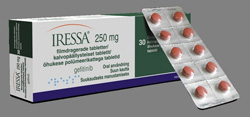
Backtracking on a positive decision it made four years ago, Britain's National Institute for Health and Care Excellence (NICE) has dealt a blow to AstraZeneca ($AZN) by withdrawing its endorsement of the company's drug Iressa for the treatment of non-small cell lung cancer patients who have failed previous treatments. NICE, which made the recommendation in a draft guidance document, continues to recommend Roche's ($RHHBY) competing drug, Tarceva, for some second-line patients.
Iressa (gefitinib) and Tarceva (erlotinib) both inhibit a tumor mutation known as EGFR-TK, and NICE does recommend both as first-line treatments for non-small cell lung cancer patients with the mutation. But according to NICE, it is updating its recommendations based on advice from clinicians, who told an independent advisory committee that after patients receive EGFR-TK inhibitors, they build up a sensitivity to them. Therefore they are unlikely to benefit from the drugs if their cancers return. Some patients with aggressive tumors can still receive Tarceva while they wait for their EGFR-TK mutation status to be confirmed, NICE suggests.
 |
| NICE CEO Sir Andrew Dillon |
"The ongoing review of these two treatments incorporates new evidence on the clinical and cost effectiveness of erlotinib and gefitinib--the revised recommendations aim to ensure that patients are offered the most appropriate treatments," said NICE CEO Andrew Dillon in a statement. The agency is now taking comments on the revised recommendations.
It wasn't easy for AstraZeneca to get NICE on board with Iressa after European regulators approved the drug in 2010. It was only after AstraZeneca offered to supply the drug to the country's National Health Service at a fixed price of £12,200 (then about $17,560) that NICE said yes.
And the cost watchdog is still being a stickler on price, even with Tarceva. Earlier this year, the agency said it was considering pulling its recommendation of Tarceva for second-line treatment of non-small cell lung cancer, but in April it backed off on that threat. Still, in its most recent guidance, NICE says its favorable stance on Tarceva will only hold if Roche provides the drug at a previously agreed-upon discount.
As for AstraZeneca, it's counting on a basketful of new immunotherapies to help it reduce its reliance on older drugs like Iressa. During its quarterly earnings release in late July, the company said it would soon start a Phase III trial to test its PD-L1 checkpoint inhibitor MEDI-4736 in head and neck cancer. It already has an ongoing pivotal study of the immunotherapy in non-small cell lung cancer. The company has struck deals to study the drug in combination with products from Incyte ($INCY), Advaxis ($ADXS) and Kyowa Hakko Kirin. It's all part of CEO Pascal Soriot's promise to grow sales 75% to $45 billion by 2023.
Special Reports: Top 10 pharma companies by 2013 revenue - AstraZeneca | The 25 most influential people in biopharma today - Sir Andrew Dillon
- here's the statement from NICE
- read more at PharmaTimes